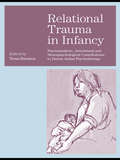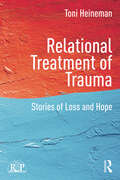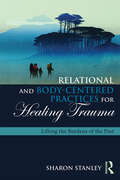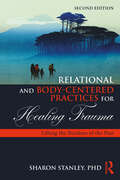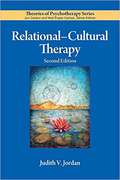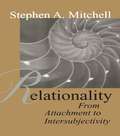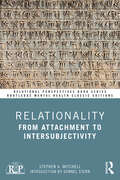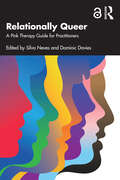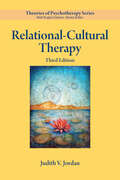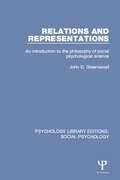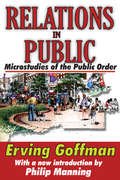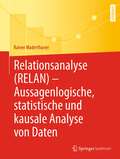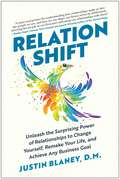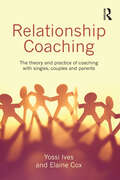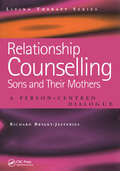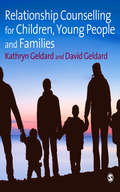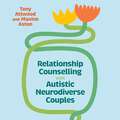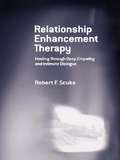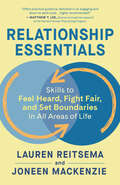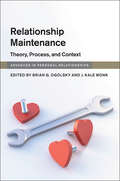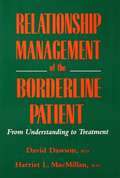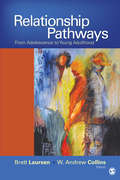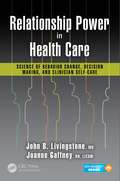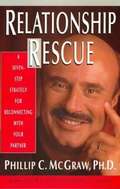- Table View
- List View
Relational Trauma in Infancy: Psychoanalytic, Attachment and Neuropsychological Contributions to Parent-Infant Psychotherapy
by Tessa BaradonThis book presents an interdisciplinary discussion between researchers and clinicians about trauma in the relationship between infants and their parents. It makes an innovative contribution to the field of infant mental health in bringing together previously separated paradigms of relational trauma from psychoanalysis, attachment and the neurosciences. With contributions from a range of experts, areas of discussion include: intergenerational transmission of relational trauma and earliest intervention the nature of the traumatising encounter between parent and infant the therapeutic possibilities of parent-infant psychotherapy in changing the trajectory of transmitted trauma training and supporting professionals working with traumatised parents and infants. Relational Trauma in Infancy will be of particular interest to trainee and qualified child and adult psychotherapists, clinical psychologists, child and adult psychiatrists, psychoanalysts, health care professionals and social workers.
Relational Treatment of Trauma: Stories of loss and hope (Relational Perspectives Book Series)
by Toni HeinemanRelational Treatment of Trauma: Stories of loss and hope is the culmination of over 35 years of psychotherapy with children and adults, many of whom have suffered the effects of physical, emotional, or sexual abuse. It addresses a gap in the literature on the treatment of trauma and chronic loss that are ubiquitous parts of life in foster care. While "trauma-informed care" has received considerable attention recently, there is little that focuses on the consequences of repeated, unexpected, and unexplained or unexplainable losses of caregivers. Relational Treatment of Trauma explores the ways in which those experiences arise in the therapeutic relationship and shows how to help clients build the trust necessary for establishing healthier, and more satisfying and hopeful relationships. Toni Heineman introduces and reinforces the concept of the relationship as the most powerful agent of therapeutic change. She highlights the ways in which clinicians can build and sustain a relationship with clients whose experience of trauma can make them wary of trusting, illustrating this theme throughout the book with compelling case vignettes. The book is especially valuable for psychoanalysts, clinical psychologists, psychiatrists, social workers, and family therapists working with those who have suffered traumatic loss. It is essential reading for clinicians in the early part of their career, working with traumatized individuals for the first time. Dr. Heineman has practiced in San Francisco for over 35 years, working with children, adults, and families. She is the founder and executive director of A Home Within. Dr. Heineman presents and publishes widely.
Relational and Body-Centered Practices for Healing Trauma: Lifting the Burdens of the Past
by Sharon StanleyRelational and Body-Centered Practices for Healing Trauma provides psychotherapists and other helping professionals with a new body-based clinical model for the treatment of trauma. This model synthesizes emerging neurobiological and attachment research with somatic, embodied healing practices. Tested with hundreds of practitioners in courses for more than a decade, the principles and practices presented here empower helping professionals to effectively treat people with trauma while experiencing a sense of mutuality and personal growth themselves.
Relational and Body-Centered Practices for Healing Trauma: Lifting the Burdens of the Past
by Sharon StanleyThe second edition of Relational and Body-Centered Practices for Healing Trauma expands on this groundbreaking model for the treatment of trauma. It includes new principles and healing practices to address individual and collective trauma from climate instability, colonization, the global pandemic, and political unrest. Dr. Stanley expands on body-based relational practices, including subjectivity, embodied intersubjectivity, reflective empathy, and community practices, to embody ancient ways of knowing. She helps individuals and communities respond to adversity with vitality, empathy, and love.Dr. Stanley combines research in neuroscience and phenomenology, extensive clinical therapeutic experience, knowledge gained from training thousands of students, and collaboration with Indigenous people and traditional societies around the globe. With cross-cultural wisdom, she delves into aspects of somatic therapy and cultural healing, including: Key elements of relational empathy, such as bracketing biases while allowing one’s presence to connect with others, the self, and spiritual understanding The role of homeostasis in healing, which vitalizes recovery from psychological, social, cognitive, and spiritual dimensions of trauma How collective trauma can be effectively healed through relational community support This new edition helps readers deepen and expand their understanding and practice of somatic healing to transform their practice, as well as their connection with others and themselves.
Relational-Cultural Therapy
by Judith V. JordanIn this second edition of Relational–Cultural Therapy (RCT), Judith V. Jordan returns to explore the history, theory, and practice of relationship centered, culturally oriented psychotherapy. <p><p> Western psychological theories generally depict human development as moving from dependence to independence. In contrast, RCT is built on the premise that, throughout the lifespan, human beings grow through and toward connection, and that we need connections to flourish. This theory views isolation, at both individual and cultural levels, as a major source of suffering. The goal of the relational therapist is to deepen the therapeutic relationship and, ultimately, the client’s relationships outside of therapy. The client’s relational images—positive or negative expectations created by past relationships – influence current relationships, and a negative image can result in disconnections between people and society. This essential primer, amply illustrated with case examples, is perfect for graduate students and seasoned practitioners alike. This new edition highlights new research on the effectiveness of RCT in a variety of real-world situations—such as developing team-building exercises in workplaces, and providing a theoretical frame for an E.U.-sponsored conference on human trafficking.
Relationality: From Attachment to Intersubjectivity (Relational Perspectives Book Series #Vol. 20)
by Stephen A. MitchellIn his final contribution to the psychoanalytic literature published two months before his untimely death on December 21, 2000, the late Stephen A. Mitchell provided a brilliant synthesis of the interrelated ideas that hover around, and describe aspects of, the relational matrix of human experience. Relationality charts the emergence of the relational perspective in psychoanalysis by reviewing the contributions of Loewald, Fairbairn, Bowlby, and Sullivan, whose voices converge in apprehending the fundamental relationality of mind. Mitchell draws on the multiple dimensions of attachment, intersubjectivity, and systems theory in espousing a clinical approach equally notable for its responsiveness and responsible restraint. Relationality "signals a new height in Mitchell's always illuminating writing" (Nancy Chodorow) and marks the "coming of age" of the relational perspective in psychoanalysis (Peter Fonagy).
Relationality: From Attachment to Intersubjectivity (Relational Perspectives Book Series)
by Stephen A. MitchellThis book, first published in the year of the author’s death, expresses Mitchell’s vision for the theory of relational psychoanalysis, and provides his most-developed expression of its foundations. Now republished in this Classic Edition, Mitchell’s ideas are brought back to the psychoanalytic readership, complete with a new introduction by Donnel Stern. In his final contribution to the psychoanalytic literature, the late Stephen A. Mitchell provided a brilliant synthesis of the interrelated ideas that describe the relational matrix of human experience. Relationality charts the emergence of the relational perspective in psychoanalysis by reviewing the contributions of Loewald, Fairbairn, Bowlby, and Sullivan, whose voices converge in apprehending the fundamental relationality of the human mind. Mitchell draws on the multiple dimensions of attachment, intersubjectivity, and systems theory in espousing a clinical approach equally notable for its responsiveness and responsible restraint. This remains a canonical text for all relational psychoanalysts and psychotherapists.
Relationally Queer: A Pink Therapy Guide for Practitioners
by Dominic Davies Silva NevesRelationally Queer explores diverse intimate relationship styles and the connections with self for clinicians interested in gender, sex and relationship diversity. Offering readers a more inclusive and queer-friendly way of thinking about relationships, the book covers a range of topics that include intersectionality, consensual non-monogamy, working with shame, intimate partner violence, religious identities, and living with HIV. Exploring beyond a Eurocentric perspective, the book features a chapter on African-centred therapy and also includes the relationships of often erased populations such as bisexual people, sex workers, people with chronic health issues and trans people. The book will help psychosexual and relationship therapists, counsellors and psychologists who work with clients of diverse genders, sexualities and relationships.
Relational–Cultural Therapy: A Relational-cultural Approach With Couples (Theories of Psychotherapy Series®)
by Judith V. Jordan PhDIn this third edition, Judith Jordan explores the history, theory, and practice of relationship-centered, culturally oriented psychotherapy as a tool for building meaningful connections in a world of increasing isolation. This essential primer is ideal for students and practitioners alike, guiding them through the ins and outs of relational–cultural therapy (RCT). New to this edition is real-world research and guidelines related to distance learning, working with marginalized groups, and working towards social justice. Jordan built RCT upon the understanding that people need social and emotional connections to flourish. In a digital era full of uncertainty and disconnection, it is more important than ever to mend relational resilience and reestablish positive, growth-fostering relationships. The therapist therefore works to deepen their bond with the client to help them build similar bonds outside of therapy. They work with the client&’s relational images based on positive and negative experiences to manage expectations and teach relationship-building skills.
Relations and Representations: An introduction to the philosophy of social psychological science (Psychology Library Editions: Social Psychology #12)
by John D. GreenwoodWhat is the nature of social psychological science? What does a realist approach to human behaviour offer? Originally published in 1991, this lucid introduction to the philosophy of social psychological science takes a new and original approach to the subject. The author repudiates traditional empiricist and hermeneutical accounts, advancing instead a realist philosophy of social psychological science that maintains objectivity while at the same time stressing the social dimensions of mind and action. The author provides novel perspectives on the problems and potential of those sciences concerned with human behaviours that are constituted as meaningful actions by their social relational, and representational dimensions. He focuses in particular on the social identity of human actions and psychological states, on the objectivity of theoretical description and causal explanation, and on the role of experimentation. This approach, aimed at reconciling our scientific interest with our human intuitions, results in a richer conception of social psychological theory and phenomena than was found in most contemporary theoretical accounts. A stimulating and thought-provoking text, this title will still be of special value to students and teachers of psychology, sociology, anthropology and philosophy.
Relations in Public: Microstudies of the Public Order (Pelican Ser.)
by Erving GoffmanUntil recently, to be in a public place meant to feel safe. That has changed, especially in cities. Urban dwellers sense the need to quickly react to gestural cues from persons in their immediate presence in order to establish their relationship to each other. Through this communication they hope to detect potential danger before it is too late for self-defense or flight. The ability to read accurately the informing signs by which strangers indicate their relationship to one another in public or semi-public places without speaking, has become as important as understanding the official written and spoken language of the country.In Relations in Public, Erving Goff man provides a grammar of the unspoken language used in public places. He shows that the way strangers relate in public is part of a design by which friends and acquaintances manage their relationship in the presence of bystanders. He argues that, taken together, this forms part of a new domain of inquiry into the rules for co-mingling, or public order.Most people give little thought to how elaborate and complex our everyday behavior in public actually is. For example, we adhere to the rules of pedestrian traffic on a busy thoroughfare, accept the usual ways of acting in a crowded elevator or subway car, grasp the delicate nuances of conversational behavior, and respond to the rich vocabulary of body gestures. We behave differently at weddings, at meals, in crowds, in couples, and when alone. Such everyday behavior, though generally below the level of awareness, embodies unspoken codes of social understandings necessary for the orderly conduct of society.
Relationsanalyse (RELAN) - Aussagenlogische, statistische und kausale Analyse von Daten
by Rainer MaderthanerDieses Lehrbuch führt in die Relationsanalyse, eine neue Methode der statistischen Auswertung ein. Das vorliegende Konzept richtet sich keineswegs nur an FachstatistikerInnen, sondern soll für möglichst viele EmpirikerInnen mit etwas statistischem Interesse konkrete Nutzungsanregungen bieten. Diese ist eine logisch-statistische Methode zur Analyse, Exploration und Prüfung von multivariaten, multifunktionalen und kausalen Hypothesen aus verschiedenen Fachgebieten. Zunächst wird die Methode in ihren Grundzügen erklärt und anschließend wird auf die Vorteile dieser Methodik im Vergleich zu bereits bestehenden statistischen Methoden eingegangen. Das dafür spezifisch entwickelte und online verfügbare Computerprogramm RELAN wird detailliert, praxisnah und anhand von Beispielen erklärt. Das Buch eignet sich für LeserInnen verschiedener Interessenslagen und enthält daher eine Leseanleitung, je nachdem, ob man mehr an der Theorie oder der praktischen Nutzung der Methode interessiert ist. Als Anwendungsgebiete kommen Psychologie, Soziologie, Biologie, Medizin, Pharmakologie, Ökonomie, Ökologie, Meteorologie, Astrophysik, … in Frage, in welchen die erforschten Gesetze multikausal, bedingt-kausal, indirekt-kausal und multieffektiv beschrieben werden können.
Relationshift: Unleash the Surprising Power of Relationships to Change Yourself, Remake Your Life, and Achieve Any Business Goal
by Justin BlaneyLearn to leverage your relationships so you can dream bigger, achieve whatever you want, and build a life that makes you happier with each passing day. No greater force for change exists than the people we surround ourselves with. Relationshift explores how the people in your life have colored your worldview, how this limits or expands your options, and what to do about it. Through the stories of British explorer Gertrude Bell, abolitionist hero Frederick Douglass, music icons the Beastie Boys, and many others, this book will help you: Learn how to connect with high-caliber people who can help you go further in life. Understand the rules of life as handed down through countless generations—then learn how to recognize which ones can be bent. Grow in happiness, thankfulness, peace, and contentment while eliminating the power of negative emotions. Explore how our minds reject new concepts like our bodies reject viruses. Build a personal tribe that can help you achieve any goal in work, health, or relationships. Make better choices by learning to see your options more clearly and honing your ability to move quickly with less information. Identify relationships that have the most impact on your wellbeing, for better or worse. Discover and refine the direction of your life by exploring wisdom from twenty experts on purpose. With dozens of illustrations and practical examples, Relationshift will help you take greater control of your life and uncover a path to your best possible future.
Relationship Coaching: The theory and practice of coaching with singles, couples and parents
by Elaine Cox Yossi IvesRelationship Coaching provides a comprehensive guide to coaching to achieve relationship success and enrichment in three main areas: to help single people to form and secure stable relationships, to assist couples seeking to enhance their relationship and to support parents looking to improve their relationships with their children. Yossi Ives is an experienced relationship coach and Elaine Cox is an expert on developmental coaching approaches. They explain how the fundamental elements of coaching are customised and adapted to meet the needs of relationship enhancement. The book introduces specific coaching theories, processes and techniques through the use of practical case studies, which provide insight into a range of applications and contexts, and introduces new ways of approaching marriage and singles coaching. Relationship Coaching combines an accessible, practical guide with a strong theoretical underpinning. It will be an essential guide for coaches, counsellors and students, as well as other professional helpers including social workers and ministers.
Relationship Counselling - Sons and Their Mothers: A Person-Centred Dialogue (Living Therapies Series)
by Richard Bryant-JefferiesYoung men trying to resolve traumatic experiences and relationship issues with their mothers is not an area that has attracted a great deal of attention, and yet it is not uncommon. Peter is 28, still living at home and feeling ‘like I just don’t have a life I can call my own.’ As he tries to remedy this, the reaction he gets is ""So, where have you been?"; "What time do you call this?"; "I’ve been worrying about you" ;"You said you’d be back before now." Any pleasure from his evening melts away and he wonders why on earth is he still in the same house as her. This book uses fictitious dialogue to enable readers to experience the struggle of a young man trying to break free from the damaging and dominating influence of his mother. It contains both counselling sessions and supervision sessions, inviting the reader to step into the therapeutic process and experience Peter (the client) as he struggles to create a life for himself, Michael (his counsellor) seeking to offer and maintain the therapeutic conditions of congruence, empathy and unconditional positive regard, and Suzy (Michael’s supervisor). Practical advice, reflections on the counselling process, helpful summaries and points for discussion are highlighted throughout. Counsellors, trainees, supervisors and other health and social care professionals dealing with relationships will find this book valuable reading. Men who have encountered difficult relationships with their mothers are also likely to gain greater insight and find support through reading this book.
Relationship Counselling for Children, Young People and Families
by Kathryn Geldard David Geldard"If you need one book that's crammed with clinically excellent, genuinely well informed and useful ideas for working with family relationships in all their permutations, this is undoubtedly it" - Professor Colin Feltham, Sheffield Hallam University "This is easy to read and has a clear layout. Counselling MSc students may find it an interesting introduction to the topic" - Times Higher Education Magazine, May 2009 This book is a practical skills-based introduction to relationship counselling. It covers couple counselling for parents, whole-family counselling and counselling for children and young people with regard to their relationships with siblings, peers and parents. The text also includes: o an introduction to relationship counselling theory and concepts o discussion of the importance of relying on a clearly defined theory of change o ways to address parenting issues o an exploration of confidentiality, disclosing inappropriate behaviour and personal safety. Kathryn Geldard and David Geldard present an integrative model of relationship counselling which combines skills and strategies from a number of approaches. Their practical guide integrates individual and subgroup counselling with whole-family counselling, providing much-needed material on methods and approaches for communicating with children and young people. The book will be invaluable to new relationship counsellors learning the skills required in order to bring about change, and will be a useful reference book for experienced counsellors.
Relationship Counselling with Autistic Neurodiverse Couples: A Guide for Professionals
by Tony Attwood Maxine AstonEnhance your practice and improve outcomes for autistic clients with this indispensable guide by world-leading autism experts Tony Attwood and Maxine Aston.When working with couples where one or both partners are autistic, traditional therapeutic approaches can fall short. Differences in communication styles, expectations, and emotional processing can lead to misunderstandings-not only between partners but also between clients and their counsellor. Without a deep understanding of autism, therapists may unintentionally provide advice that is ineffective or even harmful.This book bridges the gap between conventional relationship counselling and the specific needs of neurodiverse couples. Drawing on research and firsthand accounts from autistic individuals and their partners, it equips therapists with the essential knowledge and practical strategies needed to provide affirming, effective support.From identifying autism in the counselling room to making meaningful adaptations in sessions, this resource will expand your therapeutic toolkit and empower you to foster healthier, more fulfilling relationships for neurodiverse couples.
Relationship Enhancement Therapy: Healing Through Deep Empathy and Intimate Dialogue
by Robert F. ScukaRelationship Enhancement Therapy (RE) is a couples-therapy system conceived of, designed, and first implemented by Bernard Guerney Jr., who integrated the client-centered theory of Carl Rogers, the interpersonal theory of Henry Stack Sullivan, the behavior modification and learning theories of Skinner and Bandura, and the psychodynamic theory of Freud, in formulating RE. In this book Dr. Scuka presents an up-to-date, comprehensive theoretical and practical treatment of RE, in which he gives the reader a guide to implementing the principles of this dynamic theory. The book is written principally with couples therapy in mind, although there is an acknowledged relevance to family therapy, and the author calls attention the many skills and therapy techniques that would be applicable to family therapy. Though designed to allow a therapist of any level of experience to begin working with the RE model, this book is more than a standard cookbook, as it considers a variety of special RE therapy techniques, discusses the entire clinical intake process, the application of the RE model to the treatment of affairs, use with difficult clients, and family therapy issues such as domestic violence and stepfamilies.
Relationship Essentials: Skills to Feel Heard, Fight Fair, and Set Boundaries in All Areas of Life
by Lauren Reitsema Joneen MackenzieBuild life-enhancing relationships, restore damaged ones, and prevent communication breakdowns before they happenUsing real-world examples, illustrations from their own lives, and a research-based approach, dynamic daughter-mother duo Lauren Reitsema and Joneen Mackenzie guide you through familiar relationship situations. Their suggestions can be used with your partner, coworkers, children, extended family members, and friends. Drawing from their experience teaching thousands through The Center for Relationship Education, they introduce practical, easy-to-use strategies that will help you communicate more effectively and work through relationship challenges with confidence. When applied in any area of your life, these tools can have seemingly miraculous love- and life-enhancing results.
Relationship Maintenance: Theory, Process, and Context (Advances in Personal Relationships)
by Brian G. Ogolsky J. Kale MonkRelationship maintenance encompasses a wide range of activities that partners use to preserve their relationships. Despite the importance of these efforts, considerably more empirical focus has been devoted to starting (i.e. initiation) and ending (i.e. dissolution) relationships than on maintaining them. In this volume, internationally renowned scholars from a variety of disciplines describe diverse sets of relationship maintenance efforts in order to show why some relationships endure, whereas others falter. By focusing on 'what to do' rather than 'what not to do' in relationships, this book paints a more comprehensive picture of the forms, functions, and contexts of relationship maintenance. It is essential reading for scholars and students in psychology, communication, human development and family science, sociology, and couple/marriage and family therapy.
Relationship Management Of The Borderline Patient: From Understanding To Treatment
by David Dawson Harriet L. MacMillanThis volume offers guidelines for managing the therapist-patient relationship during crisis intervention and longer-term therapy with patients who exhibit borderline symptoms. Since to do no harm is the primary goal of any therapist who encounters such a patient, an appropriate therapist-patient relationship is crucial; moreover, skillful management of this relationship can, in itself, be the most effective and safe treatment. The authors present a conceptual model, based on self psychology and interpersonal theory, for reframing the borderline symptoms and the therapist's reactions. Case examples demonstrate effective relationship management and therapeutic interventions.
Relationship Pathways: From Adolescence to Young Adulthood
by Brett P. Laursen Professor W. Andrew CollinsThis book is designed to guide students through the latest developments of theory and research on relationships from adolescence to young adulthood. Unique to this text is a focus on relationship change across middle childhood into adolescence and across late adolescence into early adulthood. Experts on adolescent relationships from across the globe summarize the current state of literature on family and peer relationships, as well as the environmental and genetic factors that influence them. Students will benefit from the comprehensive, rigorous, yet accessible overview of key content; such as what defines the relationship processes, what describes the individual and contextual factors that influence relationships, family relationships, sibling relationships, and parent-child relationships during the transition into adolescence and into young adulthood.
Relationship Power in Health Care: Science of Behavior Change, Decision Making, and Clinician Self-Care
by John B. Livingstone, M.D. Joanne Gaffney, R.N., LICSWThe personal interface between clinician and patient is a misunderstood subject which can impact all areas of health care. Without adequate training in relationship science clinicians inadvertently contribute to empathic failure, poor medical decision process, difficulty changing health-related behavior, costly variation and derailment of care, extra litigation, and clinician burnout.Relationship Power in Health Care presents new knowledge and skills that empower health care and wellness professionals to become competent facilitators of behavior and lifestyle change, information transfer, and medical decision making in collaboration with their patients. The new approaches are supported by a wide variety of research and clinical evidence, derived from modern psychotherapy, brain biology, and the latest advances in health coaching and nursing science. Putting them to work to improve health care makes good sense both scientifically and ethically.This comprehensive text integrates past health psychology models starting from the 1950s with recent advances made since the 1990s in relationship psychology and interpersonal neurobiology. It also includes videos of brief medical interviews along with analysis of the strategies and tactics used. The tactics outlined and the interview demonstrations, conducted by a highly experienced clinical social worker and nurse Joanne Gaffney, offer a unique opportunity for all clinicians to acquire valuable skills in both clinician self-care and patient care.
Relationship Power in Health Care: Science of Behavior Change, Decision Making, and Clinician Self-Care
by John B. Livingstone, M.D. Joanne Gaffney, R.N., LICSWThe personal interface between clinician and patient is a misunderstood subject which can impact all areas of health care. Without adequate training in relationship science clinicians inadvertently contribute to empathic failure, poor medical decision process, difficulty changing health-related behavior, costly variation and derailment of care, extra litigation, and clinician burnout.Relationship Power in Health Care presents new knowledge and skills that empower health care and wellness professionals to become competent facilitators of behavior and lifestyle change, information transfer, and medical decision making in collaboration with their patients. The new approaches are supported by a wide variety of research and clinical evidence, derived from modern psychotherapy, brain biology, and the latest advances in health coaching and nursing science. Putting them to work to improve health care makes good sense both scientifically and ethically.This comprehensive text integrates past health psychology models starting from the 1950s with recent advances made since the 1990s in relationship psychology and interpersonal neurobiology. It also includes videos of brief medical interviews along with analysis of the strategies and tactics used. The tactics outlined and the interview demonstrations, conducted by a highly experienced clinical social worker and nurse Joanne Gaffney, offer a unique opportunity for all clinicians to acquire valuable skills in both clinician self-care and patient care.
Relationship Rescue (A Seven-Step Strategy for Reconnecting with Your Partner)
by Phillip C. McgrawWith Life Strategies, Phil McGraw helped hundreds of thousands of people take responsibility for their own actions and break free from self-destructive habits and situations. Now he turns his honest, unflinching eye toward relationships--diagnosing them, repairing them, and maintaining them. This hands-on book is for people who realize their relationship is in trouble, but who don't want to give up on it. In addition, it includes questionnaires, profiles, and checklists that will keep readers focused and aware of their feelings. Phil McGraw has already established himself as someone whom readers can turn to for direct, tell-it-like-it-is help in their own lives. Now he offers readers the chance for further happiness through meaningful, fulfilling relationships that work. Dr. McGraw helps get relationships back on track with a controversial explosion of the myths of conventional relationship thinking and clear action-oriented steps for reconnecting partners.
